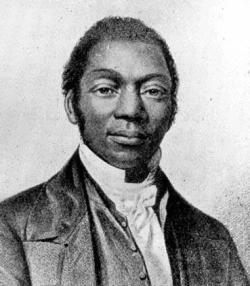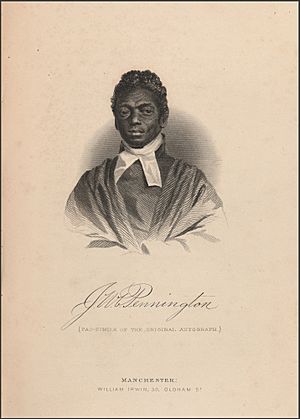James W. C. Pennington facts for kids
Quick facts for kids
James W.C. Pennington
|
|
|---|---|
 |
|
| Born | c. 1807 |
| Died | October 22, 1870 (aged 62–63) |
James William Charles Pennington (born around 1807 – died October 22, 1870) was an important African-American leader. He was a powerful speaker, a Christian minister, a writer, and a strong supporter of ending slavery (an abolitionist). He was very active in Brooklyn, New York.
Pennington escaped slavery when he was 19 years old. He traveled from western Maryland to New York. After working and studying in Brooklyn, he became the first African American allowed to attend classes at Yale University. However, he could not officially enroll. He later became a minister in the Congregational Church and also served in Presbyterian churches. He led congregations in Hartford, Connecticut, and New York. After the American Civil War, he served churches in Mississippi, Maine, and Florida.
Before the Civil War, Pennington was a key figure in the abolitionist movement. He even represented America at a big conference about slavery in London. In 1850, a new law called the Fugitive Slave Act made it very risky for escaped slaves in the North. Pennington was in Scotland at the time. He stayed in the British Isles while friends worked to buy his freedom. He also gave speeches in England to raise money for the fight against slavery.
Pennington wrote and published what many believe is the first history book about Black people in the United States. It was called The Origin and History of the Colored People (1841). His own life story, a memoir called The Fugitive Blacksmith, was first published in London in 1849.
Contents
Early Life and Escape from Slavery
James was born into slavery in 1807. This happened on a large farm in Maryland. When he was four, James and his mother were given to their master's son as a wedding gift. They moved to a new farm called Rockland, near Hagerstown, Maryland. There, James learned important skills like carpentry and blacksmithing.
On October 28, 1827, when he was 19, James bravely escaped from the farm. He had to leave his parents and eleven brothers and sisters behind. After a difficult journey, James reached Adams County, Pennsylvania. There, a kind Quaker couple, William and Phoebe Wright, took him in. They were happy to help the escaped slave. They started teaching him to read and write and paid him for his work. James was illiterate, meaning he couldn't read or write. He adopted the middle name "William" after his helper. He chose the last name "Pennington" after Isaac Penington, an important English Quaker.
Life in New York and Education
A year later, in 1828, Pennington moved north to Brooklyn, New York. He found a job as a coachman for a rich lawyer. He kept learning, paying tutors with his earnings. He even taught himself Latin and Greek. New York had a law to slowly end slavery. By 1827, all adults were finally free. In the early 1800s, Brooklyn still had many enslaved workers. They were important for the farms in the area.
Pennington attended the first Negro National Convention in Philadelphia in 1829. This was a meeting for Black leaders to discuss their rights. He continued to be active in these conventions, even becoming their leader in 1853. Within five years of his escape, he had learned so much that he was hired to teach school. This was in Newtown, which is now part of Elmhurst, Queens.
He also became involved with the Shiloh Presbyterian Church in Manhattan. Wanting more education, he was allowed to attend classes at Yale University. However, he had to sit in the back and could not ask questions. After studying at the Yale Divinity School, Pennington became a minister. He first served a church on Long Island, likely in Queens.
It is important to remember that Yale University did not officially accept Pennington as a student in the 1830s. He could attend classes but could not participate like a regular student. He never received a degree from Yale. It wasn't until 2016 that the Yale Divinity School honored him. They renamed a classroom after him. The first Black student to officially get a degree from Yale was Richard Henry Green, in 1857.
In 1840, Pennington was called to lead the Talcott Street Church in Hartford, Connecticut. While serving as minister, he wrote The Origin and History of the Colored People (1841). This book is thought to be the first history of African Americans.
Fighting for Freedom and Rights
Pennington became deeply involved in the movement to end slavery. He was chosen to be a delegate at the Second World Conference on Slavery in London. While in England, churches invited him to preach and lead services. When he returned to Hartford, he told his white minister friends about this. He convinced them to let him preach in their churches too. He became the first Black pastor to preach in many Connecticut churches.
In 1844, he told his friend John Hooker that he was an escaped slave. He worried about his future. Hooker secretly tried to buy Pennington's freedom from his former owner, Frisby Tilghman. Hooker and Pennington did not have the $500 Tilghman demanded. Tilghman died soon after.
Pennington also helped seek justice for West African people from the Mende people group. They had been illegally taken as slaves. They rebelled on their ship and sailed it to Long Island. The United States then took them into custody. In the Amistad case (1839-1841), courts had to decide if the Mende people were property or free. The Supreme Court of the United States finally ruled in favor of the Mende. They said that since the African slave trade was banned, these people were free. They had the right to defend themselves and seek freedom. When the West Africans won their case, 35 chose to return to Africa. Pennington started the United Missionary Society. This was the first Black missionary group. It helped raise money for their journey home.
Pennington was in Scotland when the Fugitive Slave Law of 1850 was passed. This law made it much more dangerous for escaped slaves in the North. It forced even free states like New York to help capture and return escaped slaves. It also made it easy for slave catchers to take free Black people. Pennington was asked to serve the Shiloh Presbyterian Church in New York in 1850. But he was afraid to return because of the new law. John Hooker worked with abolitionists in England to raise money to buy Pennington's freedom. They bought him from Tilghman's estate after the planter had died. Hooker briefly took legal "ownership" of Pennington. This allowed him to legally free Pennington in New York.
Pennington stayed in the British Isles for almost two years for his safety. He traveled widely in Europe, giving speeches and raising money for the cause against slavery. He had finished his memoir, The Fugitive Blacksmith, which was published in London in 1849. This book told his story of escaping slavery and becoming an educated minister. While in Europe, the University of Heidelberg gave Pennington an honorary doctorate degree. He was the first African American to receive such an honor.
After returning to the United States, Pennington helped fight against segregation on New York City streetcars. Segregation meant Black people had to sit in separate sections. In 1854, a schoolteacher named Elizabeth Jennings Graham was arrested for riding in a "whites only" streetcar. She won her case in court.
In 1859, Pennington himself was arrested for riding in a "white only" streetcar. He was represented by the Legal Rights Association. This group was started by Elizabeth Jennings' father. Pennington successfully challenged the system. In 1855, the State Supreme Court ruled that such racial segregation was illegal. By 1865, all streetcar companies had ended their segregated systems.
Civil War and Later Life
Pennington believed in peace and did not support violence. However, during the American Civil War (1861-1865), he helped recruit Black troops for the Union Army. After the war ended, he served as a minister in Natchez, Mississippi for a short time. Then he moved to Portland, Maine, where he served for three years.
In early 1870, he returned to the South. The Presbyterian Church had asked him to serve in Florida. He started a church for African Americans in Jacksonville, Florida. He died there on October 22, 1870, after a short illness.
Legacy and Honors
In 1849, the University of Heidelberg gave Pennington an honorary doctorate degree. The university has also created the James W.C. Pennington Award in his honor. This award is given to scholars who have done important work on topics that mattered to Pennington.
Works
- The Origin and History of the Colored People (1841): This book is considered the first history of African Americans. In it, Pennington directly challenged ideas from former President Thomas Jefferson about Black people being "inferior."
- The Fugitive Blacksmith (1849): This was his memoir, or life story. It was published first in London.
 | Shirley Ann Jackson |
 | Garett Morgan |
 | J. Ernest Wilkins Jr. |
 | Elijah McCoy |


